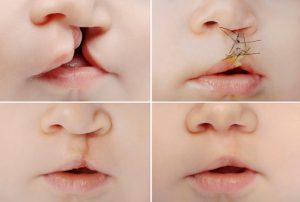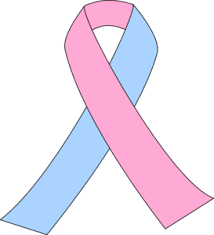January is National Birth Defects Prevention Month. Among the most common birth defects is cleft lip. Cleft lip is a birth defect that occurs when a baby’s lip or mouth does not form properly in the womb. Collectively, these birth defects commonly are called “orofacial clefts”.
The lip forms between the fourth and seventh weeks of pregnancy. A cleft lip develops if the lip tissue does not join completely before birth, resulting in an opening of the upper lip. The opening in the lip varies in size from a small slit or a large opening that goes through the lip into the nose.
The causes of orofacial clefts among most infants are unknown. However, they are thought to be caused by a combination of genetics or other factors, such as things the mother comes in contact with in her environment, or what the mother eats or drinks, or certain medications she uses during pregnancy. Recently the Center for Disease Control reported findings from research studies about risk factors that increase the chance of infant orofacial cleft:
- Smoking―Women who smoke during pregnancy are more likely to have a baby with an orofacial cleft than women who do not smoke
- Diabetes―Women with diabetes diagnosed before pregnancy have an increased risk of having a child with a cleft lip with or without cleft palate, compared to women who did not have diabetes
- Use of certain medicines―Women who used certain medicines to treat epilepsy during the first trimester (the first 3 months) of pregnancy are at greater risk
Orofacial clefts, especially cleft lip with or without cleft palate, can be diagnosed during pregnancy during a routine ultrasound. Services and treatment for children with orofacial clefts can vary depending on:
- The severity of the cleft
- The child’s age and needs
- The presence of associated syndromes
- Other birth defects
Surgery to repair a cleft lip usually occurs in the first few months of life and is recommended within the first 12 months of life. Children born with orofacial clefts might need other types of treatments and services, such as special dental or orthodontic care or speech therapy.
If you are an expecting mother in need of a doctor, Flushing Hospital Medical Center’s Department of Obstetrics offers a wide variety of services to expectant mothers. For more information or to schedule an appointment, please call 718-670-8994.
All content of this newsletter is intended for general information purposes only and is not intended or implied to be a substitute for professional medical advice, diagnosis or treatment. Please consult a medical professional before adopting any of the suggestions on this page. You must never disregard professional medical advice or delay seeking medical treatment based upon any content of this newsletter. PROMPTLY CONSULT YOUR PHYSICIAN OR CALL 911 IF YOU BELIEVE YOU HAVE A MEDICAL EMERGENCY.



